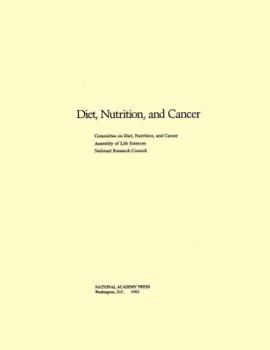Diet Nutrition And Cancer
Select Format
Select Condition 
Book Overview
Based on a thorough review of the scientific evidence, this book provides the most authoritative assessment yet of the relationship between dietary and nutritional factors and the incidence of cancer. It provides interim dietary guidelines that are likely to reduce the risk of cancer as well as ensure good nutrition.
Format:Paperback
Language:English
ISBN:0309032806
ISBN13:9780309032803
Release Date:February 1982
Publisher:National Academies Press
Length:496 Pages
Weight:2.55 lbs.
Dimensions:8.5" x 11.0"
Customer Reviews
1 rating
Excellent Reference
Published by Thriftbooks.com User , 17 years ago
This book is a collection of review articles written to explain current research (as of 1982) on diet and cancer. It begins with an executive summary, summarizing the research results and outlining the methodology used to write the book. Then there are several chapters explaining what cancer is and the methodology used to test whether there is evidence for dietary links to cancer. The remainder of the book is divided into 3 sections: the relationship between nutrients and cancer, in which there are separate chapters for each type of nutrient (calories, lipids, proteins, carbohydrates, fiber, vitamins, minerals, alcohol), the role of nonnutritive dietary constituents (food additives, naturally occurring carcinogens, mutagens, contaminants), and patterns of diet and cancer. End material includes a glossary and an index. Sources are cited at the end of each chapter. The book is highly informative, highly readable, and it presents a no-nonsense summary of the facts. The authors, all physicians or scientists, draw exclusively on peer-reviewed scientific literature, and strive to present a balanced review of each topic. Where results of studies are inconsistent with those of other studies, they analyze what factors may have caused the differences, and whether the differences reflect uncertainty in scientific understanding or varied methodology. As these authors report, the research is clear on certain points: a diet high in calories is associated with increased cancer risk, as are diets high in fat or protein. Alcohol is a known carcinogen. Carbohydrates do not seem to be associated with either an increased or decreased cancer risk, while dietary fiber is known to lower cancer risk. Certain vitamins and minerals can also reduce cancer risk. When avoiding toxins, the consumer should keep in mind that cancer-causing chemicals are found not only in pesticide residues and additives, but can also be naturally occurring. Indeed, one of the most potent cancer-causing toxins found in the average diet is aflatoxin, a naturally occurring mycotoxin that can occur in carelessly processed peanut or corn products.





